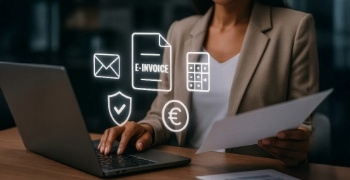
Transform your B2B ecommerce growth journey with the right tech solutions
As B2B ecommerce businesses look to scale into international markets, the landscape becomes increasingly complex.
Without proper compliance, you may struggle to run an efficient operation and operate with reduced risk. You need to meet filing deadlines, manage cross-border regulations, navigate various sales tax laws, and understand nexus — the commercial connection between your business and a U.S. state. But the right tech tools can simplify compliance challenges and position your business for growth.
Recently, Avalara hosted a webinar featuring insights from our partner, BigCommerce, alongside our mutual customer, GTSE, on navigating GTSE’s international digital expansion while staying ahead of the complexity of global compliance challenges through automation.
Let’s explore what the presenters had to say.
Be proactive, not reactive
In today’s fast-paced business landscape, proactive measures are essential for effective tax compliance. GTSE faced challenges with scattered data, leading to confusion and compliance risks. However, by adopting automation early, the company streamlined workflows and alleviated the burden of manual tasks. With Avalara and BigCommerce integrated, GTSE tackled diverse tax requirements, enabling the team to focus on strategic growth. As Louise Broadhurst, Financial Controller at GTSE, remarked, “I’ve learned from experience that understanding Avalara and its system allowed us to set up our U.S. website with tax compliance in mind from the very beginning.”
Unify your platforms
Unifying your platforms is crucial for success. BigCommerce prioritises user experience without adding complexity. The BigCommerce modular architecture facilitates innovation while maintaining core functionality. This approach allows GTSE to manage inventory across multiple sales channels, enabling swift responses to customer demand. Matt Crawford, VP of Strategic Business Development at BigCommerce, noted, “My suggestion is to consider how to get a central view of data in one place and work with a tax provider that understands data across various locations.”
Partner with the right tech providers
Teaming up with the right tech providers can be a game changer for businesses looking to scale. GTSE recognised that navigating international expansion required expert guidance. By collaborating with Avalara and leveraging BigCommerce’s powerful ecommerce tools, GTSE simplified compliance across regions. This partnership empowered the company to manage complex regulations and confidently explore new markets. As Crawford advised, “Don’t go alone. Talk to us or your accountant. The biggest tip is to be aware of what you’re doing and ask for help.”
Start small, think big
Starting small while keeping a big-picture mindset has been central to GTSE’s expansion strategy. It began by testing the waters in the U.K. before moving into the larger U.S. market. This phased approach allowed the company to learn and adapt, gathering valuable insights along the way. Gradual expansion fosters sustainable growth and builds a solid foundation. Crawford highlighted, “Start small, choose a channel or region, and give it a try. Any improvement is better than staying the same.”
Automate to scale
Automation is vital for scaling operations. GTSE faced challenges with manually tracking tax codes for shipping, a process that was both time-consuming and risky. Integrating Avalara for U.S. sales tax compliance transformed its operations, enabling the finance team to shift focus from complex regulations to growth initiatives. With reduced time spent on manual tracking, compliance improved and operational efficiency soared. Tom Armenante, Ecommerce Director at GTSE, emphasised, “When expanding internationally, compliance is crucial. Make sure you understand the regulations before you start selling.”
Who is BigCommerce?
BigCommerce is a leading open SaaS and composable ecommerce platform that empowers brands and retailers of all sizes to build, innovate, and grow their businesses online. BigCommerce provides its customers sophisticated enterprise-grade functionality, customisation, and performance with simplicity and ease of use. Tens of thousands of B2C and B2B companies across 150 countries and numerous industries rely on BigCommerce. For more information, visit bigcommerce.com
Who is GTSE?
GTSE is a leading U.K.-based manufacturer specialising in the production of high-quality cable ties, tools, and fixings. With a commitment to excellence, GTSE prioritises quality in every product, ensuring reliability and performance. GTSE leverages advanced manufacturing techniques and rigorous quality control processes to deliver innovative solutions that meet the evolving needs of its customers. From small businesses to large enterprises, GTSE’s products are trusted for their durability and effectiveness. For more information, visit gtsegroup.com.
Ready to future-proof your business?
GTSE has leveraged BigCommerce and Avalara to automate U.S. sales tax compliance, greatly improving operations and enabling efficient scaling. Navigating tax compliance is a significant challenge for businesses going global, and Avalara supports tax determination and landed cost calculations in 198 countries, allowing businesses to focus on scalability without being bogged down by manual processes.
A key benefit of this technology integration is the value of centralising data, which enables informed, data-driven decisions and boosts overall efficiency. By integrating its ecommerce platform with operational data, inventory, and customer information, GTSE can spot growth opportunities and streamline workflows. In an environment where regulations vary by country, proper documentation is essential. Failing to comply can lead to hefty fines and lost growth opportunities. By automating compliance with Avalara, businesses can stay on top of local tax laws and redirect resources towards scaling operations.
So, whether you’re just starting or looking to fine-tune your strategy, now’s the time to upgrade your tech stack and embrace automation to improve your ecommerce operations. To explore this further, fill in your details here to access the complimentary guide on maximising the potential of your ecommerce tech stack for growth. If you’re looking to deepen your understanding, check out the full webinar here. Discover how the integration of Avalara and BigCommerce with your ERP will not only keep you compliant but also drive significant growth.

Avalara Tax Changes 2026 is here
The 10th edition of our annual report engagingly breaks down key policies related to sales tax, tariffs, and VAT.
Stay up to date
Sign up for our free newsletter and stay up to date with the latest tax news.



